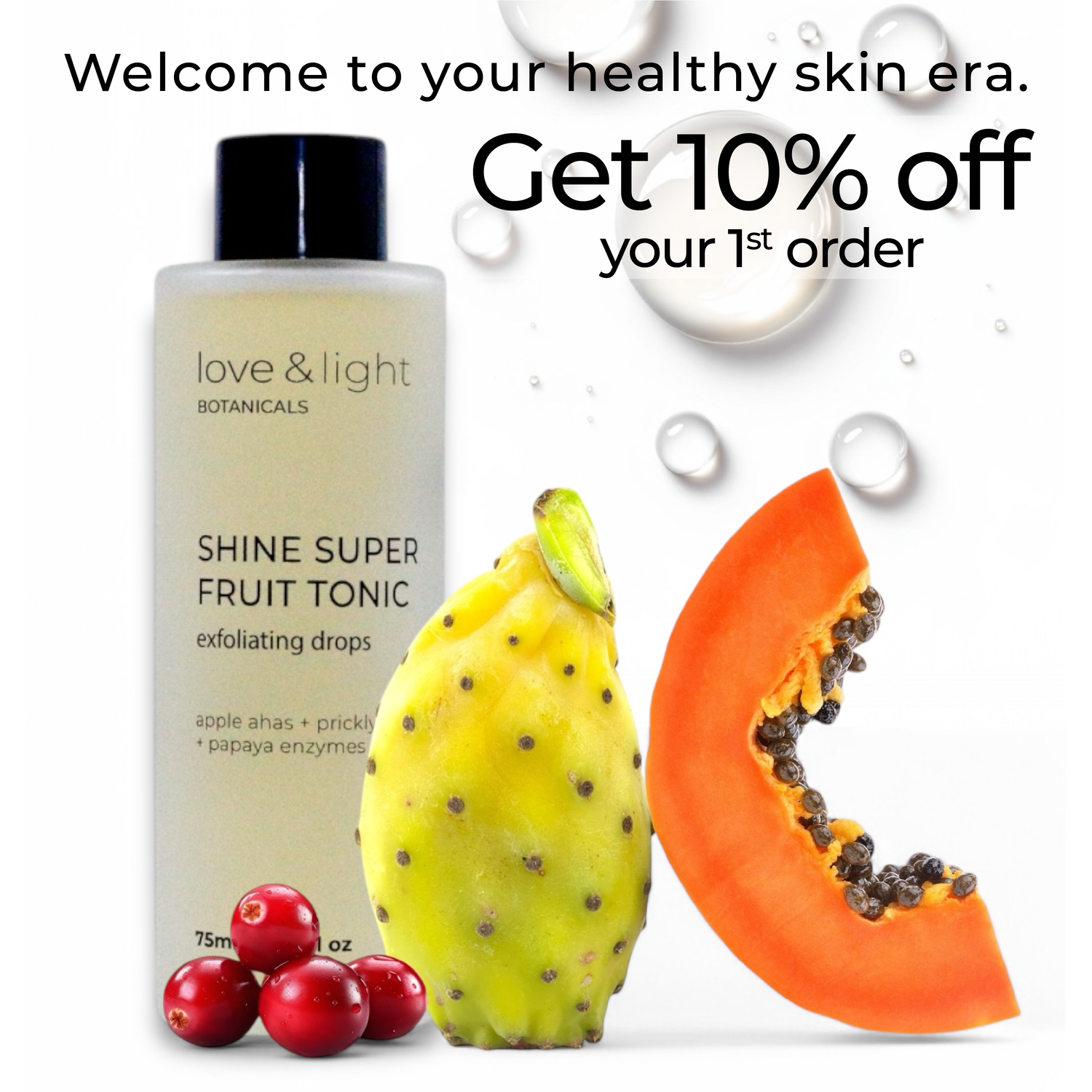Why plants = better skincare ingredients
There is a growing interest in botanical skincare, and for good reason. Skincare products crafted from plant-derived ingredients offer a long list of benefits for both your skin and the environment when compared with synthetic cosmetic raw ingredients.
Gentle on skin
Botanical skincare ingredients are preferred by natural skincare brands because of their synergy with the skin, Creating a gentler product with lower likelihood of sensitivities. Unlike synthetic ingredients that more commonly cause irritation or adverse reactions, botanical extracts are more widely tolerated by all skin types.
If you’re experiencing skin sensitivity with off-the-shelf products this could be caused by the synthetic ingredients, dyes, fragrances and preservatives that are required to achieve the shelf life required by mass-produced and distributed products. Love and Light Botanicals formulates with plant based ingredients and does not add unnecessary dyes or fragrance.
Retinol (Vitamin A) is a prime example of a widely used synthetic skincare ingredient with safety concerns. the effectiveness of prescription retinoids is well known, however it can be skin sensitizing for some resulting in dryness, irritation and flaky skin. [1] While there are both natural animal and plant forms of Vitamin A, the version used in skincare is predominantly synthetically produced in a laboratory.
it’s important to note that even when ingredients are natural, allergies could still come into play. if you’ve got a known food allergy make sure your brand provides trust in labeling every ingredient. The FDA does not currently regulate the labeling of allergens, fragrances and patented formulations, so choose a conscientious brand that provides transparency.
Effectiveness
There is growing research on the efficacy of natural plant based ingredients in skincare.
Scientifically, it’s no wonder. plants are packed with an abundance of natural compounds that offer endless possibilities in the form of skin benefits and fending off the signs of environmental stressors that lead to photoaging [3]. These compounds come with the added benefits of lower risk of irritation, allergies, and adverse effects and the ability to deliver effective results.
As a gentler alternative to traditional skincare treatments, harnessing the antioxidant and anti-inflammatory properties of botanical extracts may prove beneficial for a number of conditions that dermatologists routinely treat primarily with synthetic medications. [1]
Plant extracts are often rich in bioactive compounds; these molecules can have photo-protective activity due to their ability to absorb UV-A and UV-B radiation. Algae and other sea plant species are a great example of this. They produce metabolites (examples: fucoxanthin, phloroglucinola) which posses the ability to inhibit natural tyrosinase resulting in reducing hyperpigmentation.
There is high antioxidant activity of algae extracts; due to the extreme conditions in which they often live, are naturally exposed to oxidative stress, so they’ve developed efficient strategies to protect itself through free-radical-scavenging [2]
Why they’re better for the planet
Sustainable
Botanical skincare products are not only beneficial for your skin but also for the environment. Natural ingredients are biodegradable and have lower toxicity to the planet and our bodies over synthetic cosmetic ingredients. [4]
Yhe cultivation and extraction of plant-based ingredients have a lower environmental impact compared to the resources required to develop synthetic ingredients in a laboratory setting. By opting for botanical skincare, you're choosing products that are more sustainable and eco-friendly, helping to minimize harm to the planet.
Natural plant extracts for cosmetic use are derived from both naturally occurring plants and industrially processed plant by-products, reducing industrial waste from other industries like food and beverage. These raw material resources can be used or recycled to create natural topical antioxidants, actives and preservatives, taking products that are currently underutilized or discarded and turning them into a valuable resource, reducing waste and pollution. [4]
Smaller botanical-focused skincare brands also have a common interest and are committed to ethical sourcing and production practices. Bocusing on things like ensuring that ingredients are harvested responsibly, supporting local communities economic wellness and overall quality of life. Supporting botanically focused skincare brands is ultimately contributing to a more ethical and socially responsible beauty industry.
You can feel great about incorporating botanical skincare products into your routine both for your skin health and the impact on our environment. Here’s to enjoying the extensive benefits of natural ingredients while making a positive impact on the planet.
references
- Stallings AF, Lupo MP. Practical uses of botanicals in skin care. J Clin Aesthet Dermatol. 2009 Jan;2(1):36-40. PMID: 20967187; PMCID: PMC2958188.
- Ariede, M.B.; Candido, T.M.; Morocho Jacome, A.L.; Robles Velasco, M.V.; de Carvalho, J.C.M.; Baby, A.R. Cosmetic attributes of algae—A review. Algal Res. 2017, 25, 483–487. [Google Scholar] [CrossRef]
- Juliano, C.; Magrini, G.A. Cosmetic Functional Ingredients from Botanical Sources for Anti-Pollution Skincare Products. Cosmetics 2018, 5, 19. https://doi.org/10.3390/cosmetics5010019
- Hoang, H.T.; Moon, J.-Y.; Lee, Y.-C. Natural Antioxidants from Plant Extracts in Skincare Cosmetics: Recent Applications, Challenges and Perspectives. Cosmetics 2021, 8, 106. https://doi.org/10.3390/cosmetics8040106


